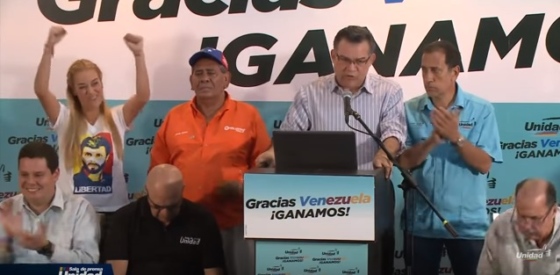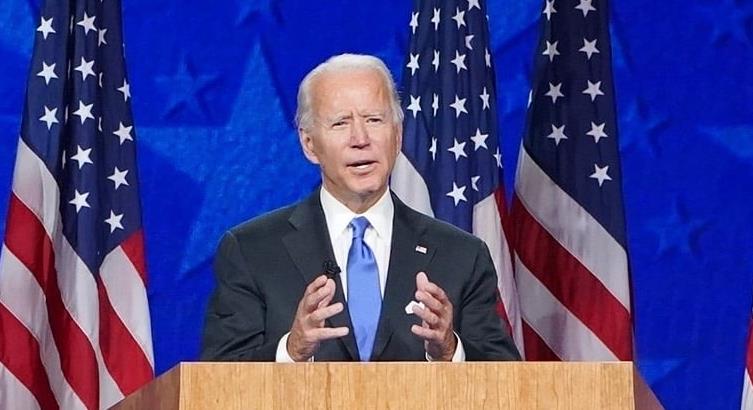
What Does the Future Hold for Venezuela?
What do the election results mean for President Nicolás Maduro and his grip on the presidency?
A Daily Publication of The Dialogue
The administration of U.S. President Donald Trump has increased sanctions on Venezuelan President Nicolás Maduro’s government in recent years in an effort to pressure Maduro to step down. Former Vice President Joe Biden, who is seeking to unseat Trump in the November presidential election, has also voiced support for tougher Venezuela-related sanctions and, like the Trump administration, has expressed support for opposition leader Juan Guaidó, whom the United States recognizes as Venezuela’s legitimate interim president. But, unlike Trump, Biden has said he will extend Temporary Protected Status, or TPS, to Venezuelans. If Biden is elected president, how would he change U.S. policy on Venezuela? How would Biden’s actions on Venezuela affect the South American country and Maduro’s hold on it? What influence would Kamala Harris, Biden’s running mate, have on U.S. policy toward Venezuela as vice president?
Juan S. Gonzalez, former U.S. deputy assistant secretary of state and former special advisor to Vice President Joe Biden: “Under Donald Trump, U.S. policy is skewed toward one purpose—re-election, no matter the cost. His demonization of immigrants, especially from Latin America and the Caribbean, is a dog whistle to a minority of Americans who fear their place in an increasingly diverse United States. Trump’s embrace of autocrats, such as Vladimir Putin and Kim Jung Un, undermines America’s credibility globally on matters of democracy. His disregard for the rule of law at home and in international relations is unraveling hard-fought gains America and its partners achieved over decades. There is no room for real strategy, based on real American interests, in such an agenda. That is why the Trump administration’s approach to Venezuela must be viewed entirely through the distorted prism of South Florida politics. His get-out-the-vote strategy for South Florida consists of tough talk and sanctions but lacks coherence. His refusal to grant Temporary Protected Status to Venezuelans, the continued deportation of hundreds of Venezuelans and the underwhelming response to the humanitarian situation make clear that this administration’s approach is electoral and without regard to the suffering or the democratic aspirations of the Venezuelan people. As president, Joe Biden will stand with the Venezuelan people and for democracy by granting TPS to Venezuelans, marshaling a robust international response to the humanitarian crisis, targeting regime supporters involved in corruption and human rights abuses, wherever they go, recovering assets stolen from the Venezuelan people, leading international pressure for free and fair elections, and aiding the country’s long-term recovery. While Joe Biden is someone who supports the use of multilateral sanctions to compel the Maduro regime to restore democratic freedoms to Venezuela, he rejects the Trump administration’s failed approach of unilateral sanctions in lieu of a comprehensive multilateral policy approach to Venezuela.”
Diego Arria, member of the Advisor board, director of the Columbus Group and former permanent representative of Venezuela to the United Nations: “To provide some context: No previous U.S. president has been more committed and helpful in the efforts to rescue our freedom than Trump, and so far, U.S policy toward Venezuela has been bipartisan, and I trust it will continue to be regardless of the electoral outcome. However, Biden’s comments to go back to Obama’s openings toward Cuba is of real concern to us, because Cuba is the real dominant power of Venezuela. It controls its intelligence services, security and even military forces, as well as foreign policy, so it should be clear to all that opening doors to Cuba would mean closing doors for freedom in Venezuela. It is true that providing Temporary Protected Status for the Venezuelan diaspora is very important, but not more so than to continue exercising maximum pressure to remove Maduro’s narco-tyranny, a real threat not limited to destroying Venezuela, but also the whole region, including the United States. Somehow, Maduro and his band of thugs, as well as its ‘allies’—China, Russia, Iran, Turkey and Cuba—are rooting for Biden, convinced that were he to win, it would guarantee Maduro’s permanence in power. Somehow such hope is shared by other radical forces looking to change the political situation in countries such as Brazil, Colombia and Chile. For the first time, a U.S. presidential election could have real consequences in our region.”
Ray Walser, retired foreign service officer and professor at Seton Hall University’s School of Diplomacy and International Relations: “The 2020 Democratic platform soundly rejects President Trump’s ‘failed Venezuela policy,’ which it blames for entrenching the ‘dictatorial regime’ of Nicolás Maduro and ‘exacerbating a human rights and humanitarian crisis.’ This said, it is unclear, given the intransigence of the Maduro regime, what constructive steps a Biden-Harris administration can take to deal effectively with the ongoing crisis. Fresh emphasis would likely be placed on working with the Lima Group and others to isolate Maduro and address a severe humanitarian and refugee crisis. The Biden team appears to favor multilateral sanctions as opposed to unilateral U.S. sanctions. If no viable democratic alternative emerges, support for interim President Juan Guaidó will continue. Matters will become more complicated with the Dec. 6 National Assembly elections in Venezuela, an electoral process in which Guaidó has announced the opposition will not participate. The new administration might explore capitalizing on better ties with Cuba to perhaps leverage Maduro’s removal and an acceptable transition in Venezuela. As to the role of a Vice President Harris, one might expect considerable engagement. A Biden-Harris approach will focus on bringing to the front a team of veteran diplomats, more consistent messaging, engaging the full range of resources of the State Department and focusing aggressively on humanitarian issues. Yet, as Nov. 3 approaches, the Biden-Harris campaign will also need to be mindful of strong opposition to Cuban and Venezuelan authoritarianism in critical Florida and elsewhere. A commitment to TPS for Venezuelans would be a step in that direction.”
Laura Carlsen, director of the Americas program of the Center for Economic and Policy Research (CEPR): “There are many ways in which Biden and Trump align on Venezuela policy, particularly on the unethical assumption of a U.S. government role in regime change. Both are also in favor of intervening in Venezuelan internal politics. However, Biden and Harris have expressed a commitment to human rights and peaceful transition, and with progressive forces in the Democratic Party exercising pressure, they will be far less likely to initiate military actions, coups or assassination attempts that would violate international law and erode U.S. leadership. The current strategy is in crisis with the failure of sanctions, the collapse of Guaidó’s bid for power and the need to prioritize responses to the pandemic, so a Biden presidency will have ample opportunity for a reset. Biden supports multilateral sanctions and measures, as opposed to Trump’s unilateral approach—an important distinction. Both he and Harris have emphasized alliance-building in their Venezuela policy. This could lead to a review of current sanctions, since European allies have rejected any sanctions that increase massive human suffering in the global and worsening humanitarian crisis due to Covid-19 and its economic consequences. Although he has been skeptical of dialogue, as president, Biden also would be obliged to listen to calls for dialogue and U.N. involvement supported by regional powerhouses Mexico and Argentina. Dialogue continues to be essential to reconciliation, peace and rebuilding democratic institutions in the country. It is unlikely that Harris will be the point person in the hemisphere that Biden was under Obama given her lack of foreign policy experience and her importance in leading on pressing domestic issues such as racial and gender justice.”
Ryan C. Berg, research fellow in Latin America Studies at the American Enterprise Institute: “Early in his administration, President Donald Trump elected to pursue an aggressive campaign of sanctions against Nicolás Maduro’s government in Venezuela. The country’s authoritarian regime and its humanitarian crisis graced his agenda from the earliest days of his presidency, spurred by Oval Office meetings with Venezuelan opposition leaders and their spouses. Joe Biden, too, has signaled his support for the Venezuelan opposition, particularly interim President Juan Guaidó, and the continuation of a sanctions campaign against Venezuela’s criminal regime. Kamala Harris has expressed similar positions on Venezuela and may handle the Latin America profile in a Biden administration, as Biden himself did in the Obama administration. Regardless of who wins in November, U.S. policy on Venezuela must undergo a serious rethink and reboot—not because sanctions have failed to rein in the Maduro regime or curtail the regime’s sources of illicit financing, but rather because rigged elections make Maduro’s takeover of the National Assembly a near fait accompli. With the opposition boycotting the December elections, Guaidó will likely lose his position of significant international visibility. How will the United States continue to support the Venezuelan opposition if many of them lose their seats in Maduro’s phony elections? Will the United States pursue secondary sanctions to continue ratcheting up the pressure on those countries that have assisted Maduro? And how will the United States deal with the flow of migrants from the country and a growing humanitarian crisis in the region writ-large? These challenges and more will confront whoever wins in November.”
 The Latin America Advisor features Q&A from leaders in politics, economics, and finance every business day. It is available to members of the Dialogue’s Corporate Program and others by subscription.
The Latin America Advisor features Q&A from leaders in politics, economics, and finance every business day. It is available to members of the Dialogue’s Corporate Program and others by subscription.
What do the election results mean for President Nicolás Maduro and his grip on the presidency?
Presidente emérito do Inter-American Dialogue, Peter Hakim diz que maioria republicana sabe que Hillary é provável vencedora.
Michael Shifter fue entrevistado por Gerardo Torres de El Salvador sobre los temas más destacados en la agenda regional. Entre otros asuntos, Shifter habló sobre el futuro de la paz en Colombia, la crisis política y económica en Venezuela, y el impacto de las elecciones de Estados Unidos en la región.
 Joe Biden // Photo: Biden Campaign.
Joe Biden // Photo: Biden Campaign.

